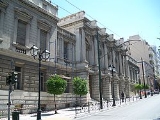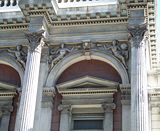
National Theatre of Greece
Encyclopedia
The National Theatre of Greece is based in Athens
, Greece
.
and Efstratios Rallis to give theatre a permanent home in Athens. The foundations for this new project were laid on Agiou Konstantinou Street and the building itself was designed by the famous Saxonian architect noted for many other public buildings in Athens at the time, Ernst Ziller
. Despite problems getting the building done in time, it was eventually completed in the late 1890s and in 1900 Angelos Vlachos was appointed as the Director.
The National Theater began to expand its operations and in 1901 a Drama School opened. The same year, the Royal Theatre opened its doors to the public with a monologue from Dimitris Verardakis' play Maria Dozapatri and two Greek one-act comedies: Dimitris Koromilas' The Death of Pericles and Charalambos Anninos' Servant Required. Following the first performance the theatre began to expand in popularity among Greece's upper and upper middle classes and staged more productions. One of the most famous of the period was Aeschylus
' Oresteia, staged in a prose translation by Yorgos Sotiriadis. The production sparked a long linguistic conflict, between the adherents of katharevousa
and the modern Demotic Greek. Students from the University of Athens' School of Philosophy, incited by their classicist professor, Yorgos Mistriotis, marched down Agiou Konstantinou in an attempt to halt the performance. The episodes that followed, known as the Oresteiaka, resulted in one death and ten injuries on November 8, 1903.
In 1913, upon the assassination of King George, the Royal Theater was bequeathed to his son, Prince Nicholas of Greece and Denmark
, who was a painter and playwright
.
The theatre entered into a period of decline, occasionally playing host to foreign theatre companies, until 1932. It remained closed until the National Theatre was founded, under an act of parliament signed by the education minister, Giorgos Papandreou, on May 30, 1932.
 The first home of the National Theatre was commissioned by King George I
The first home of the National Theatre was commissioned by King George I
and designed by the architect Ernst Ziller
. It was built between 1895 and 1901. The "Royal Theatre" occupied the historic neo-classical building on Agiou Konstantinou Street from 1901 to 1908, but went bankrupt and was forced to close. The building was renovated in 1930 and 1931 under the supervision of the set designer Kleovoulos Klonis. Since 1932 the building has been the home of the National's Central Theatre. In 2009, the complete renovation of the building was completed.
The National Theatre of Greece Drama School
(GNT Drama School) was founded in 1930, since when it has operated in tandem with the National Theatre of Greece.
Athens
Athens , is the capital and largest city of Greece. Athens dominates the Attica region and is one of the world's oldest cities, as its recorded history spans around 3,400 years. Classical Athens was a powerful city-state...
, Greece
Greece
Greece , officially the Hellenic Republic , and historically Hellas or the Republic of Greece in English, is a country in southeastern Europe....
.
History
The theatre was originally founded in 1880 with a grant from King George IGeorge I of Greece
George I was King of Greece from 1863 to 1913. Originally a Danish prince, George was only 17 years old when he was elected king by the Greek National Assembly, which had deposed the former king Otto. His nomination was both suggested and supported by the Great Powers...
and Efstratios Rallis to give theatre a permanent home in Athens. The foundations for this new project were laid on Agiou Konstantinou Street and the building itself was designed by the famous Saxonian architect noted for many other public buildings in Athens at the time, Ernst Ziller
Ernst Ziller
Ernst Moritz Theodor Ziller was a Saxon architect who later became a Greek national, and in the late 19th and early 20th centuries was a major designer of royal and municipal buildings in Athens, Patras and other Greek cities.- Buildings :* Presidential Mansion, Athens* National Theatre of...
. Despite problems getting the building done in time, it was eventually completed in the late 1890s and in 1900 Angelos Vlachos was appointed as the Director.
The National Theater began to expand its operations and in 1901 a Drama School opened. The same year, the Royal Theatre opened its doors to the public with a monologue from Dimitris Verardakis' play Maria Dozapatri and two Greek one-act comedies: Dimitris Koromilas' The Death of Pericles and Charalambos Anninos' Servant Required. Following the first performance the theatre began to expand in popularity among Greece's upper and upper middle classes and staged more productions. One of the most famous of the period was Aeschylus
Aeschylus
Aeschylus was the first of the three ancient Greek tragedians whose work has survived, the others being Sophocles and Euripides, and is often described as the father of tragedy. His name derives from the Greek word aiskhos , meaning "shame"...
' Oresteia, staged in a prose translation by Yorgos Sotiriadis. The production sparked a long linguistic conflict, between the adherents of katharevousa
Katharevousa
Katharevousa , is a form of the Greek language conceived in the early 19th century as a compromise between Ancient Greek and the Modern Greek of the time, with a vocabulary largely based on ancient forms, but a much-simplified grammar. Originally, it was widely used both for literary and official...
and the modern Demotic Greek. Students from the University of Athens' School of Philosophy, incited by their classicist professor, Yorgos Mistriotis, marched down Agiou Konstantinou in an attempt to halt the performance. The episodes that followed, known as the Oresteiaka, resulted in one death and ten injuries on November 8, 1903.
In 1913, upon the assassination of King George, the Royal Theater was bequeathed to his son, Prince Nicholas of Greece and Denmark
Prince Nicholas of Greece and Denmark
Prince Nicholas of Greece and Denmark , of the House of Schleswig-Holstein-Sonderburg-Glücksburg, was the fourth child and third son of George I, King of the Hellenes, and of Queen Olga. He was known as "Greek Nicky" in the family to distinguish him from his cousin Czar Nicholas II of Russia...
, who was a painter and playwright
Playwright
A playwright, also called a dramatist, is a person who writes plays.The term is not a variant spelling of "playwrite", but something quite distinct: the word wright is an archaic English term for a craftsman or builder...
.
The theatre entered into a period of decline, occasionally playing host to foreign theatre companies, until 1932. It remained closed until the National Theatre was founded, under an act of parliament signed by the education minister, Giorgos Papandreou, on May 30, 1932.
The Central Theatre

George I of Greece
George I was King of Greece from 1863 to 1913. Originally a Danish prince, George was only 17 years old when he was elected king by the Greek National Assembly, which had deposed the former king Otto. His nomination was both suggested and supported by the Great Powers...
and designed by the architect Ernst Ziller
Ernst Ziller
Ernst Moritz Theodor Ziller was a Saxon architect who later became a Greek national, and in the late 19th and early 20th centuries was a major designer of royal and municipal buildings in Athens, Patras and other Greek cities.- Buildings :* Presidential Mansion, Athens* National Theatre of...
. It was built between 1895 and 1901. The "Royal Theatre" occupied the historic neo-classical building on Agiou Konstantinou Street from 1901 to 1908, but went bankrupt and was forced to close. The building was renovated in 1930 and 1931 under the supervision of the set designer Kleovoulos Klonis. Since 1932 the building has been the home of the National's Central Theatre. In 2009, the complete renovation of the building was completed.
Children's Theatre
The theatre is situated in the basement of the Sikiarideio Hall. It was designed to operate as a music hall, but soon became a cinema. Its ownership was taken over by the Ministry of Culture in 1987, and since 1993 the National Theatre has staged children's productions there.Drama School
- Main Article: National Theatre of Greece Drama SchoolNational Theatre of Greece Drama SchoolThe National Theatre of Greece Drama School was founded in 1930, since when it has operated in tandem with the National Theatre of Greece...
The National Theatre of Greece Drama School
National Theatre of Greece Drama School
The National Theatre of Greece Drama School was founded in 1930, since when it has operated in tandem with the National Theatre of Greece...
(GNT Drama School) was founded in 1930, since when it has operated in tandem with the National Theatre of Greece.

